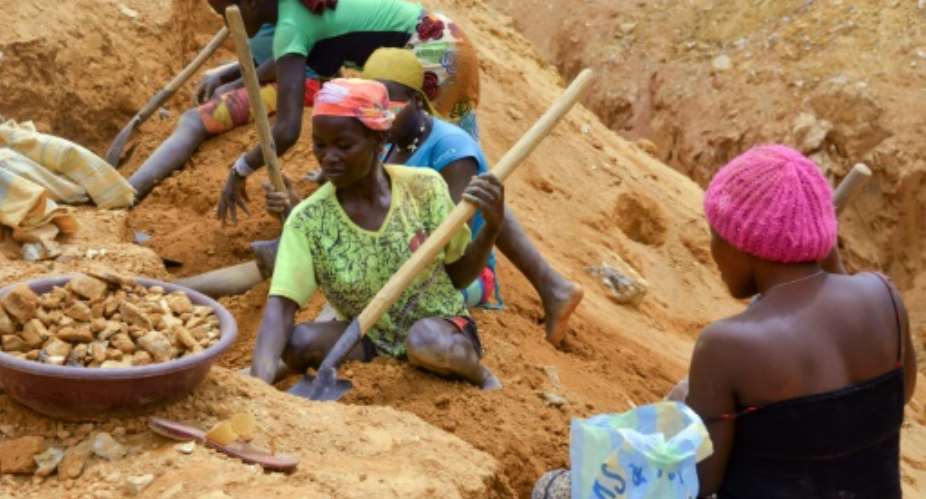Killings, land grabs, corruption... tensions and violence are rising in eastern Cameroon as Chinese firms take advantage of a regulatory twilight zone to mine gold.
"There are constant conflicts between Cameroonians and the Chinese" over gold mining, said Narma Ndoyama, a farmer in Longa Mali, a small village in the middle of the mining area.
At the beginning of April, four companies were banned from mining in East Cameroon, according to Foder, a group that campaigns for protecting the environment and rural development.
One of them was the Chinese firm Lu and Lang, which is notorious in the region after one of its employees allegedly killed a Cameroonian who was looking for gold on land claimed by the company, according to Foder.
"Villagers rioted and killed the Chinese man" by stoning him, said Ndoyama.
The mining company resumed its activities at Longa Mali after a brief halt.
The Chinese "killed my son, but they did nothing" for me, said Philippe Balla, the victim's father. "They are working and no one bothers them."
Anger still simmers among locals over companies buying agricultural land "for crumbs", said Michel Pilo, who is the village elder for Mali, the area which encompasses Longa Mali.
"They devastate our fields," he said, saying a patch of land worth 500,000 CFA francs (750 euros, $925) was purchased for 80,000.
Farmers feel they have no choice but to sell, said a local official.
"You can't refuse because if you do your land will be dug up without the payment of any compensation," said the official on condition of anonymity.
Ndoyama is one of the few farmers to still have cultivable land.
He sees the encroachment of Chinese miners as a threat to his cassava farm.
"They are already alongside my field" where they are digging up the earth looking for gold.
"They haven't trampled on my land, but I am afraid they will," said Ndoyama.
Locals have repeatedly called, in vain, for authorities to properly set property boundaries.
"I am waiting for my land to be surveyed to launch a case to save my farm," said Ndoyama.
AFP contacted several Chinese miners in the region who declined to discuss the complaints of locals against them.
'No transparency'
 Employees at a Chinese mining company operate machinery at a mining site near Longa Mali
Employees at a Chinese mining company operate machinery at a mining site near Longa Mali
"It is easy to vent anger against the Chinese, but who brought them in" to the region? said Gabriel Yadji, a representative of the eastern region in the mining ministry.
"It is Cameroonians that have led them to behave like they do," he added.
The process of gaining a mining permit is labyrinthine and none has ever been awarded for industrial mining. All mining is small scale.
The individuals who receive permits, Cameroonians mostly, rent or sell them to foreign companies.
"There is no transparency on the procedures to obtain mining permits," said Foder, which says it tried in vain to gain access to the register of issued permits.
The local press says the Cameroonian elite -- including generals, colonels, lawmakers, ministers and a nephew of President Paul Biya hold mining permits, but it is impossible to confirm the information.
The suspicions of corruption do not only surround the obtention of mining permits.
"The army protects the Chinese at all their mining sites to the detriment of nearby communities and it participates in intimidating them and racketeering," said one activist, who asked not to be named.
There is no official data on the amount of land being mined in eastern Cameroon, which is believed to be rich in mineral resources, but remains underdeveloped and mired in poverty.
While the government has created an agency to monitor the small scale mining industry, it does not have sufficient resources to monitor all production, an employee acknowledged.
"In many cases we are happy with Chinese companies declaring their production volumes themselves," said the employee.
Cameroon's legislation stipulates that 25 percent of gold production should be handed over to the government.
In 2017, Capam said it received 255 kilos of gold from miners across the entire country. That puts the value of nation's gold output at roughly $41 million.





 We’ll no longer tolerate your empty, unwarranted attacks – TUC blasts Prof Adei
We’ll no longer tolerate your empty, unwarranted attacks – TUC blasts Prof Adei
 Bawumia donates GHc200,000 to support Madina fire victims
Bawumia donates GHc200,000 to support Madina fire victims
 IMF to disburse US$360million third tranche to Ghana without creditors MoU
IMF to disburse US$360million third tranche to Ghana without creditors MoU
 Truck owner share insights into train collision incident
Truck owner share insights into train collision incident
 Paramount chief of Bassare Traditional Area passes on
Paramount chief of Bassare Traditional Area passes on
 Two teachers in court over alleged illegal possession of BECE papers
Two teachers in court over alleged illegal possession of BECE papers
 Sunyani: Victim allegedly shot by traditional warriors appeals for justice
Sunyani: Victim allegedly shot by traditional warriors appeals for justice
 Mahama vows to scrap teacher licensure exams, review Free SHS policy
Mahama vows to scrap teacher licensure exams, review Free SHS policy
 Government will replace burnt Madina shops with a new three-story, 120-store fac...
Government will replace burnt Madina shops with a new three-story, 120-store fac...
